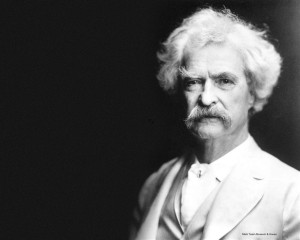
From time to time we find it useful to reflect on lessons from great storytelling masters and to let them guide us on the journey toward healthy writing.
One of our favorites is Mark Twain, who had both wisdom and wit when he talked about the art and craft of the power of words.
For example, an adjective adds additional information to the word that follows, such as blue Mercedes. But using too many adjectives, especially non-specific ones, can make writing bloated and less powerful. Our healthcare friends like to use adjectives like state-of-the-art facility, or cutting-edge technology, or innovative advanced medicine, and so on. These types of adjectives have become buzzwords in the industry and, as Shakespeare might say, they are “full of sound and fury, signifying nothing.”
Healthy writing uses precise words to paint a clear and specific picture in the mind of the reader. As Twain advised: Don’t say the old lady screamed. Bring her on and let her scream.
Regarding adjectives, here is what Twain wrote to one young student:
I notice that you use plain, simple language, short words and brief sentences. That is the way to write English – it is the modern way and the best way. Stick to it; don’t let fluff and flowers and verbosity creep in. When you catch an adjective, kill it. No, I don’t mean utterly, but kill most of them – then the rest will be valuable. They weaken when they are close together. They give strength when they are wide apart. An adjective habit, or a wordy, diffuse, flowery habit, once fastened upon a person, is as hard to get rid of as any other vice.
To another he wrote: Substitute ‘damn’ every time you’re inclined to write ‘very’; your editor will delete it and the writing will be just as it should be.
In his essay, Report to the Buffalo Female Academy, Twain was commenting on judging student writing compositions and noted of one winning entry: It shows a freedom from adjectives and superlatives which is attractive, not to say seductive – and let us remark instructively, in passing, that one can seldom run his pen through an adjective without improving his manuscript.
There is no doubt the adjective is a legitimate device for powerful writing, as long as it is not overused. Twain again on the subject: God only exhibits thunder and lightning at intervals, and so they always command attention. These are God’s adjectives. You thunder and lightning too much; the reader ceases to get under the bed, by and by.
Healthy writing that engages the reader is a conscious habit to be developed, but it need not be an all-consuming enterprise in an already busy world. Slowing down slightly to write deliberately and clearly sends a positive message about us to the ones who receive the writing.